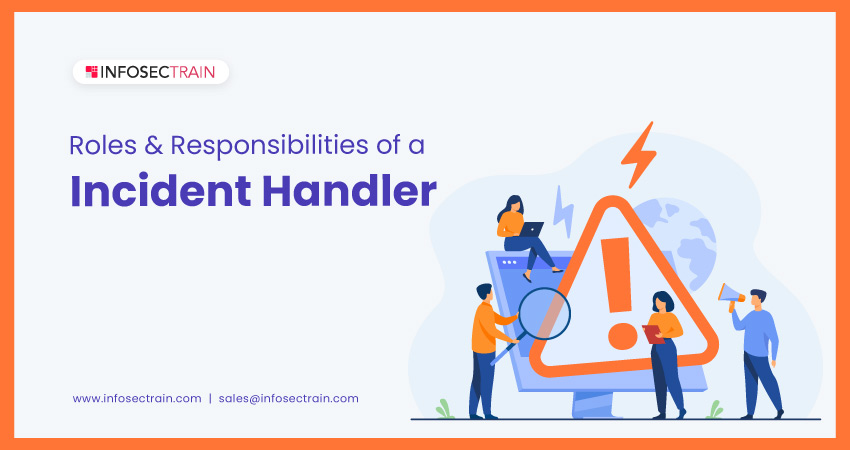Roles and Responsibilities of Incident Handler
Incident response and incident handling teams play a crucial role in every organization for identifying, analyzing, responding to, and reducing security incidents. Cyberattacks can significantly impact companies’ reputations and result in financial loss. Therefore, to mitigate such incidents, companies are required to develop an incident response team.

This comprehensive article helps you understand the roles and responsibilities of Incident Handlers and the certifications required for Incident Handler professionals.
What is an incident response?
Incident response is a process organizations use to manage various types of cyberattacks, security incidents, and data breaches. It is used to identify the cyberattack quickly, reduce the impact, and remediate the cause to mitigate future cyber incident risks. A well-curated incident response plan can address the possible vulnerabilities and help to avoid future cyber incidents.
Incident response is a subset of incident handling that works on communications, planning, logistics, and synchronicity required to resolve a cyber incident.
Incident response vs. incident handling vs. incident management
Incident response: Incident response is a set of technical procedures for analyzing, detecting, defending, and responding to a cyber incident. It comes under the incident handling and management process.
Incident handling: Incident handling is the set of procedures and processes used to manage cyber incidents. It includes the plan of action to implement before, during, and after a cyber incident is identified.
Incident management: Incident management is the IT Service Management (ITSM) process to plan and resolve cyber incidents. Incident response and incident handling work together to ensure the end-to-end process from reporting to resolving the incident.
What are the Roles and Responsibilities of an Incident Handler
The roles and responsibilities of the Incident Handler are as follows:
- Perform advanced analysis such as forensic hardware seizures, malware triage, dynamic analysis, and determining the scope of compromise during an incident
- Perform advanced threat analysis and investigate security events
- Understand CSIRT functions and participate in the analysis, containment, and eradication of cyber security incidents and events
- Analyze various security controls, such as firewalls, host intrusion prevention systems, proxy, endpoint security, application, and system records, to identify potential threats to network security
- Work with CIRT members, GM security teams, business partners, and executive leadership to coordinate response protocols
- Evaluate and transform capabilities, procedures, tactics, and techniques to execute the incident response mission
- Secure the data integrity required for cyber incident analysis to determine the operational or technical impact of the cyber incident
- Learn from previous threat experience to improve infrastructure component protection strategies and cyber incident handling procedures to prevent a cyber incident
- Handle high-impact cyber breaches and advanced attacks by incident response process and Cyber Kill Chain methodology
Education qualifications to become Incident Handler
To become an Incident Handler, employers may look for the following educational background:
- Must have a Bachelor’s degree in Computer Science, Information Assurance, Electrical Engineering, or Cybersecurity
- Work experience in information security operations, incident response, and monitoring services
- Experience in host-based security tools and network security tools
- Security certifications such as Certified Information Security Manager (CISM), Certified Ethical Hacker (CEH), or Certified Information Systems Security Professional (CISSP)
Skills required to become Incident Handler
The skills required for an Incident Handler are as follows:
- Work experience on Windows, UNIX, and Linux operating systems
- Good programming skills such as C, C#, Java, C++, PERL, ASM, and PHP
- Ability to identify and prioritize the organization’s security vulnerabilities by performing security assessments such as risk assessment, vulnerability assessment, and penetration testing
- Work experience with digital forensic software applications such as XRY, FTK, EnCase, Cellebrite, etc.
- Good knowledge of security policies and procedures for handling and responding to cyber incidents
- Ability to implement intrusion and evasion techniques to analyze attack surface
- Ability to monitor the activity of the system usage behavior and attention to details
- Work experience in investigating cyber incidents using the right technologies and methods like IDS and IPS
- Work experience with enterprise system monitoring tools and SIEMs
Certifications of Incident Handler
The following are the well-recognized certifications that are used to become Incident Handler:
- EC-Council’s Certified Incident Handler (ECIH) : EC-Council’s Certified Incident Handler (ECIH) certification course offers specialist-level incident response skills and knowledge. This certification will help verify your skills to identify, analyze, respond, and recover from a cyber incident.
- GIAC’s Certified Incident Handler (GCIH): GIAC’s Certified Incident Handler (GCIH) certification provides the ability to identify, respond, and resolve security incidents using essential security skills.
- Certified Incident Handling Engineer (CIHE) : NICCS’s Certified Incident Handling Engineer (CIHE) certification is designed to enhance your understanding of planning, designing, and utilizing the system to prevent, identify, and respond to security incidents.
- CERT Certified Computer Security Incident Handler (CSIH) : CERT- Certified Computer Security Incident Handler (CSIH) certification helps to enhance incident response and handling skills. This certification helps build an incident response team to monitor, collect, perform forensics, and analyze security incidents.
- Incident Handling and Response Professional (IHRP) : eLearnSecurity’s Incident Handling and Response Professional (IHRP) certification offers self-paced learning with learning documents that can be accessed online. This certification is designed to help enhance your practical security skills and evaluates incident handling and response capabilities through exams.
Incident Handler salary
The average salary earned by an Incident Handler in the US ranges from $95,269 to $148,000. The salary changes depend on various factors, such as the skills, experience, and certification of the candidate. Sometimes, the salary might vary based on the work location.
Incident Handler training with InfosecTrain
InfosecTrain is a leading IT security training and consulting organization focusing on a wide range of verticals in IT security certification, cloud computing, data privacy, data security, etc. Our skilled trainers will deliver the training sessions with years of industry experience with whom you can easily interact and clarify your doubts anytime.
If you are interested and want a bright career in incident response and handling, InfosecTrain provides online ECIH certification training. You can check and enroll in our EC-Council Certified Incident Handler (ECIH) training course to develop the expertise required to become a competent Incident Handler.







 1800-843-7890 (India)
1800-843-7890 (India)